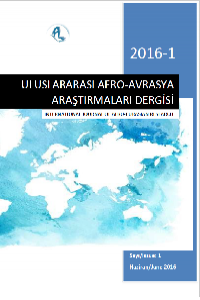Öz
Society and literature is an inseparable whole from one another. None of literary works can be separated from social and sociological events. Every literary work reflects traces of age and problematic. In this respect folklore traces in the novel will be inevitable. In this study we have done, ıt has been tried to explain sectarian, and ethnic identity differences in their effects on humans beeing semtinized in terms of folklore in the light of real identities, geographical conditions of the eastern region, in respect of beliefs, tradition, custom and life style, in the novel of author Ayşe Kulin who drawing attention with her biographical works. Folklore elements not found on many more in this direction and believe took place elements related. As well as the architecture of the region, features food, clothing styles and regional dances, folklore is rich in elements of supply.
Anahtar Kelimeler
Kaynakça
- ACIPAYAMLI, Orhan, (1974), Türkiye’de Doğumla İlgili İnanmaların Etimolojik Etüdü, Ankara.
- BORATAV, Pertev Naili,(1988), 100 Soruda Türk Halk Edebiyatı, Gerçek Yayınevi, İstanbul.
- BULUT, Halil İbrahim, (2013), “Alevi-Bektaşi Türkmen Geleneğinde Sosyal Dayanışma ve Kardeşlik Kurumu Olarak “Musahiplik” “ Türk Kültürü ve Hacı Bektaş Veli Araştırma Dergisi, Sayı 65 ss. 101,118.
- DAVARCI, Ayşe, (2005), “Türklerde Tabiat Üstü Varlıklar ve Bunlarla İlgili Kabuller, İnanmalar, Uygulamalar.” Bilig Dergisi, Sayı: 32. S. ss. 125,144.
- ELÇİN, Şükrü, (1986), Halk Edebiyatın Giriş, Kültür ve Turizm Bakanlığı Yayınları, Ankara.
- KULİN, Ayşe, (2008), Köprü, Everest Yayınları, İstanbul.
- ÖGEL, Bahaeddin ( 1982), Türklerde Devlet Anlayışı, (13. Yüzyıl Sonlarına Kadar), Başbakanlık Basımevi.
- ŞAKİR, Sabri (1939), Muhtelif Ruhlar Hakkında, Halk Bilgisi Haberleri, Sayı 98.
- ÜÇER, Cenksu, ( 2005), “Geleneksel Alevilikte İbadet Hayatı ve Alevilerin Temel İslami İbadetlere Yaklaşımları” Din bilimleri Akademik Araştırma Dergisi, Sayı: 2, ss. 161,182.
- YARMAN, O, (2002) “16. ve 17. Yüzyıllarda Türk Çalgıları”, İstanbul.
- http://www.kulturelbellek.com/halk-mimarisi-ve-ozellikleri/ (14.12.2015)
- http://www.forumdas.net/forum/konu/ayse-kulin-hayati-hakkinda-kisabilgi. 11587/ (24.04.2016)
- http://www.gulum.net/biyografi/bolumler.php?op=goster&id=2850 (24.04.2016)
Öz
Toplum ve edebiyat birbirinden ayrılmayan bir bütündür. Hiçbir yazınsal eser toplumsal ve sosyolojik olaylardan ayrı düşünülemez. Her edebi eser, içinde devrinin izlerini ve sorunsalını yansıtır. Bu bağlamda romanlarda halk bilimsel izler de kaçınılmaz olacaktır. Yapmış olduğumuz bu çalışmada da biyografik eserleriyle dikkat çeken yazar, Ayşe Kulin’in Köprü romanını, gerçek kimliklerin ışığında, doğu bölgesindeki coğrafi şartların, mezhepsel ve etnik kimlik farklılıklarının, insanlar üzerindeki etkileri; inanışlar, gelenek görenek ve yaşayış biçimi bağlamında Halk Bilimsel açıdan irdelenerek açıklanmaya çalışılmıştır. Bu doğrultuda pek çok Halk Bilimi unsuruna rastlanmış ve daha çok inanmalar ile ilgili unsurlar yer almıştır. Bunun yanı sıra bölgenin mimarisi, yemek özellikleri, giyim tarzları ve yöresel danslar, Halk Bilimi unsurları açısından zenginlik arz etmektedir.
Anahtar Kelimeler
Kaynakça
- ACIPAYAMLI, Orhan, (1974), Türkiye’de Doğumla İlgili İnanmaların Etimolojik Etüdü, Ankara.
- BORATAV, Pertev Naili,(1988), 100 Soruda Türk Halk Edebiyatı, Gerçek Yayınevi, İstanbul.
- BULUT, Halil İbrahim, (2013), “Alevi-Bektaşi Türkmen Geleneğinde Sosyal Dayanışma ve Kardeşlik Kurumu Olarak “Musahiplik” “ Türk Kültürü ve Hacı Bektaş Veli Araştırma Dergisi, Sayı 65 ss. 101,118.
- DAVARCI, Ayşe, (2005), “Türklerde Tabiat Üstü Varlıklar ve Bunlarla İlgili Kabuller, İnanmalar, Uygulamalar.” Bilig Dergisi, Sayı: 32. S. ss. 125,144.
- ELÇİN, Şükrü, (1986), Halk Edebiyatın Giriş, Kültür ve Turizm Bakanlığı Yayınları, Ankara.
- KULİN, Ayşe, (2008), Köprü, Everest Yayınları, İstanbul.
- ÖGEL, Bahaeddin ( 1982), Türklerde Devlet Anlayışı, (13. Yüzyıl Sonlarına Kadar), Başbakanlık Basımevi.
- ŞAKİR, Sabri (1939), Muhtelif Ruhlar Hakkında, Halk Bilgisi Haberleri, Sayı 98.
- ÜÇER, Cenksu, ( 2005), “Geleneksel Alevilikte İbadet Hayatı ve Alevilerin Temel İslami İbadetlere Yaklaşımları” Din bilimleri Akademik Araştırma Dergisi, Sayı: 2, ss. 161,182.
- YARMAN, O, (2002) “16. ve 17. Yüzyıllarda Türk Çalgıları”, İstanbul.
- http://www.kulturelbellek.com/halk-mimarisi-ve-ozellikleri/ (14.12.2015)
- http://www.forumdas.net/forum/konu/ayse-kulin-hayati-hakkinda-kisabilgi. 11587/ (24.04.2016)
- http://www.gulum.net/biyografi/bolumler.php?op=goster&id=2850 (24.04.2016)
Ayrıntılar
| Bölüm | Makaleler |
|---|---|
| Yazarlar | |
| Yayımlanma Tarihi | 30 Haziran 2016 |
| Yayımlandığı Sayı | Yıl 2016 Cilt: 1 Sayı: 1 |
All rights reserved. International Journal of Afro-Eurasian Research (IJAR) is an International refereed journal and published biannually. Authors are responsible for the content and linguistic of their articles. Articles published here could not be used without referring to the Journal. The opinions in the articles published belong to the authors only and do not reflect those of International Journal of Afro-Eurasian Research.


